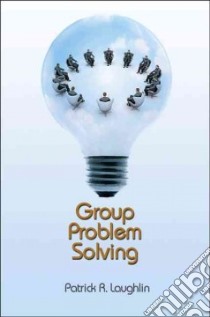- Libreria
- >
- Libri in lingua
- >
- Memory
Group Problem Solving - 9780691147918
Un libro in lingua di Laughlin Patrick R. edito da Princeton Univ Pr, 2011
- € 38.70
- Il prezzo è variabile in funzione del cambio della valuta d’origine
Experimental research by social and cognitive psychologists has established that cooperative groups solve a wide range of problems better than individuals. Cooperative problem-solving groups of scientific researchers, auditors, financial analysts, air crash investigators, and forensic art experts are increasingly important in our complex and interdependent society. This comprehensive textbook---the first of its kind in decades---presents important theories and experimental research about group problem solving. The book focuses on tasks that have demonstrably correct solutions within mathematical, logical, scientific, or verbal systems, including algebra problems, analogies, vocabulary, and logical reasoning problems.
The book explores basic concepts in group problem solving, social combination models, group memory, group ability and world knowledge tasks, rule induction problems, letters-to-numbers problems, evidence for positive group-to-individual transfer, and social choice theory. The conclusion proposes ten generalizations that are supported by the theory and research on group problem solving.
Group Problem Solving is an essential resource for decision-making research in social and cognitive psychology, but also extremely relevant to multidisciplinary and multicultural problem-solving teams in organizational behavior, business administration, management, and behavioral economics.
"It is good to see this concise and well-organized textbook become available as there hasn't been one on this subject in decades. The research is solid and among the most rigorous and meticulous of experimental work being conducted on group performance."-Verlin B. Hinsz, North Dakota State University
"Humans solve problems in groups. For almost one hundred years, psychologists have conducted studies of group problem solving, and in this book, Patrick Laughlin reviews the results of these efforts. A particularly strong aspect of Group Problem Solving is the use of mathematical models to show how group members combine their reasoning and prior knowledge in order to reach a consensus. This book will interest social psychologists, industrial-organizational psychologists, and those who want illustrations of how mathematical modeling can guide psychological research."-Earl Hunt, University of Washington
"There is no better person to write this book than Patrick Laughlin. His work on group problem solving over the past four decades has been some of the most insightful and thorough research ever conducted on this topic. This excellent book will find a prominent place on my bookshelf."-R. Scott Tindale, Loyola University, Chicago
Informazioni bibliografiche
- Titolo del Libro in lingua: Group Problem Solving
- Lingua: English
- Autore: Laughlin Patrick R.
- Editore: Princeton Univ Pr
- Collana: Princeton Univ Pr (Paperback)
- Data di Pubblicazione: 13 Febbraio '11
- Genere: PSYCHOLOGY
- Pagine: 158
- ISBN-10: 0691147914
- EAN-13: 9780691147918


